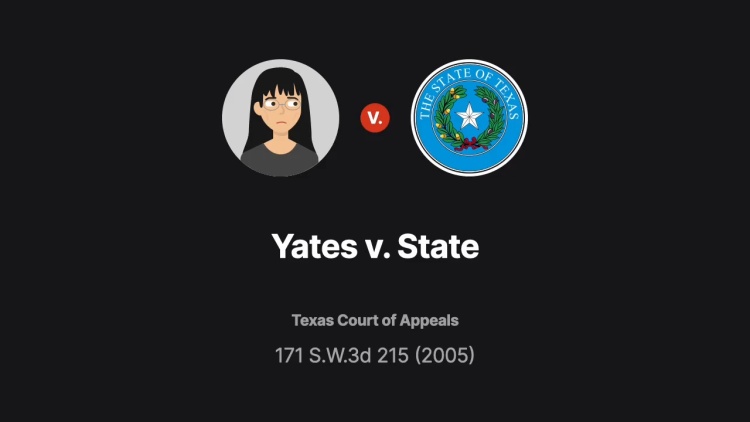Yates v. State
Court of Appeals of Texas
171 S.W.3d 215 (2005)
- Written by Craig Conway, LLM
Facts
Andrea Yates (defendant) and Russell Yates were married and had four children. Andrea had suffered from mental-health issues since she was a small child. As an adult, Andrea suffered from severe depression and once tried to commit suicide. On numerous occasions, Andrea was admitted to a hospital’s psychiatric unit for treatment after suffering from psychotic episodes. Prior to her discharge after one of these admissions, a physician, who ranked Andrea as one of the five sickest patients ever seen by the physician, informed the Yateses that Andrea had a high risk of experiencing another psychotic episode if she had another child. The following year, Andrea stopped taking her prescribed medications. Shortly thereafter, Andrea gave birth to a fifth child. Four months later, Andrea’s father died. Her father’s death caused a rapid decline in Andrea’s mental health and functioning, and Andrea was admitted to a hospital for treatment and placed on suicide watch. Approximately one month later, Andrea was discharged and began an outpatient program. Andrea’s physicians recommended that someone stay with Andrea at all times and that she not be left alone with her children. Russell’s mother went to the Yateses’ home every day, where she observed Andrea in an almost catatonic state. Andrea failed to eat, did not respond to conversation, stared into space, and trembled. Subsequently, Andrea was re-admitted to the hospital for 10 days of treatment. After being discharged, Andrea’s functioning was better, but she remained uncommunicative, withdrawn, and without emotion. During follow-up visits with her physician, Andrea denied having any suicidal or psychotic thoughts. Approximately one month later, Andrea called 911 and informed the operator that she needed the police. Andrea also telephoned Russell and instructed him to come to the house. When the police officers arrived at the Yateses’ home, they found that Andrea had drowned all five children. Andrea was charged with capital murder for the deaths of three of the five children. After a trial, the jury rejected Andrea’s insanity defense and found her guilty. Following the verdict but before the punishment phase, Andrea’s counsel learned that the state's mental-health expert witness had presented false testimony at trial. Specifically, on cross-examination, the witness testified that he had done consulting work for the television show Law & Order and that an episode of Law & Order that aired shortly before the day of the crime had featured a woman suffering from postpartum depression who drowned her children in a bathtub and was found insane. The prosecution referred to the expert's testimony about the Law & Order episode twice more as part of its case against Andrea, in the examination of another witness and during closing arguments. In fact, there was no episode of Law & Order with that plot. Andrea moved for a mistrial, but the trial court denied the motion. Andrea then requested that the jury be read a stipulation that there was no episode of Law & Order with a plot as described by the expert, and the court granted the request. Andrea was sentenced to life in prison, and she appealed.
Rule of Law
Issue
Holding and Reasoning (Nuchia, J.)
What to do next…
Here's why 904,000 law students have relied on our case briefs:
- Written by law professors and practitioners, not other law students. 47,100 briefs, keyed to 995 casebooks. Top-notch customer support.
- The right amount of information, includes the facts, issues, rule of law, holding and reasoning, and any concurrences and dissents.
- Access in your classes, works on your mobile and tablet. Massive library of related video lessons and high quality multiple-choice questions.
- Easy to use, uniform format for every case brief. Written in plain English, not in legalese. Our briefs summarize and simplify; they don’t just repeat the court’s language.





